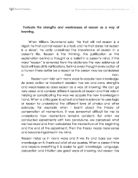Empiricists believed that all knowledge comes from experience through our senses. Some of its main philosophers were Berkeley, Hume and Locke. Hume rebelled itself from rationalist thoughts. According to Hume, neither reason nor our senses can distinguish what is right or wrong. It is our emotions. He gave the example that when you help someone, it is your emotions not your reason that tells you to help him.
Romanticists believed that one had to be in touch with his emotions in order to improve society, thus rejecting Rationalism and Enlightenment. They also believed that everything is connected to everything in this universe. Romanticists criticize reason because according to then it falsifies reality. The base of romanticist philosophy is that the best way to perceive reality is through intuitions and subjective feelings. Some of the most important Romanticist philosophers are Rousseau, Hegel and more.
Now we will look at Antonio Damasio’s theory. Antonio Damasio is a Portuguese neuroscientist. He is widely known for his contribution to a new theory on emotions and reason contradicting Descartes’ rationalism. He set up an experiment with damaged frontal lobe (area in the brain that chooses between good and bad) patients. He concluded that we need emotions to behave rationally as his emotionally flat patients were completely unable of taking decisions to the point where some of them were unable to choose between meat or fish for lunch. He also concluded that reason and emotion are two complementary systems in the human brain that are responsible for decision making. He therefore stated that one is unable to make decisions and distinguish right or wrong without the control of one of these “systems”. With this, he ran against all 20th century philosophical thoughts on emotions and reason.
In my opinion all theories are understandable. Georg Hegel, a Prussian philosopher stated that there are 3 phases to knowledge: 1) the thesis 2) the antithesis and 3) the synthesis. An example of that would be: 1) The thesis would be that the only way of arriving to the truth is only through reason (Rationalism) 2) The antithesis would be Hume’s empiricist contradiction. 3) And the synthesis would be Immanuel Kant’s where he agrees and disagrees with both the thesis and the antithesis. The cycle doesn’t stop here, because soon there will be an antithesis to Kant’s synthesis.
I personally think that Antonio Damasio’s theory is correct because it is the most recent one. What one can believe today can be different tomorrow. Opinions vary through time. A couple of centuries ago we though that the earth was flat, now we are certain that it is round (slightly oval). Our opinions change as we gain knowledge. That is why I believe in Damasio’s theory because it the most recent one, the one that has been made with the most knowledge in hand.
Reason is built up through experience. One knows through reason, that one shouldn’t stick his finger in a power supply because one might get electrocuted; however, many kids do it because of curiosity, an emotion. That means that emotions can make you take bad decisions, decisions that can harm you mentally and physically. However, I do not see myself without my emotions. Emotions give you all the beauties of life as well as all the disgraces of life. Without emotions we would be completely neutral.
An example where reason wins over emotion is in arranged marriage. Centuries ago, the higher class would arrange marriage for their sons and daughters because their reason told them that by marrying duke X they would gain land X and palace Y. The emotions of their daughters and sons would be ignored making them sad people because they weren’t allowed to marry someone for love.
An example where emotions win over reason is gender abuse. Woman X is abused by her partner, man X. She is completely in love with man X, therefore, she doesn’t report to the police him until one day during his routine beatings he murders her. This is a prime example where emotions are represented as a much stronger force than reason. If woman X had used her reason she would have called the police. However, her emotions prevented her from taking the rational decision.







